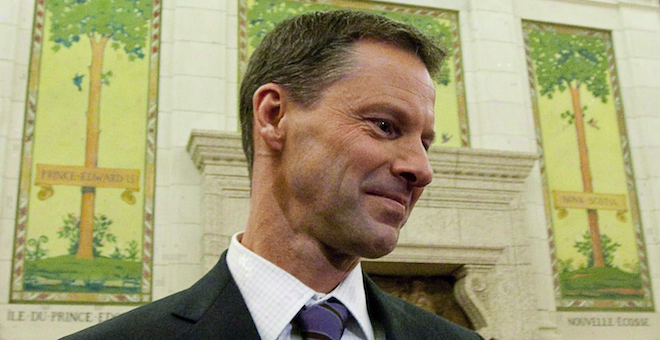A second legal look at the Wright-Duffy affair
Why the RCMP is alleging bribery and fraud took place
Nigel Wright appears as a witness at the Standing Committee on Access to Information, Privacy and Ethics on Parliament Hill in Ottawa on Nov. 2, 2010. Fresh court documents were released Wednesday alleging breach of trust against Wright, Prime Minister Stephen Harper’s former chief of staff, and shedding new light on the evolution of the Senate expense scandal. THE CANADIAN PRESS/Sean Kilpatrick
Share

Last week, the RCMP released documents alleging Nigel Wright and Senator Mike Duffy committed bribery and fraud and are being investigated for breach of trust. None of these allegations have been proven in court and charges have yet to be laid.
Maclean’s spoke with Penny Collenette, an adjunct law professor at the University of Ottawa, last week to simplify and explain the legalities of this situation. In saying how Wright’s $90,000 “gift” for Duffy could constitute bribery, Collenette explained it as a quid pro quo: money in exchange for following the PMO’s talking points. “We don’t know all the details, but [for a bribery charge, it can’t] just be negotiation,” she said.
But Duff Conacher, an adjunct professor of at the University of Toronto, disagreed with Collenette’s interpretation of the law, writing to Maclean’s that “even negotiations are illegal.” Conacher points to section 119(1)(a) of the Criminal Code of Canada, stating it is a violation for a federal politician to “corruptly… attempt to receive any money” as an official. This would implicate Duffy, who is a member of the Canadian Senate.
Wright was not an elected official at the time of the alleged wrongdoing—he was the Prime Minister’s chief of staff— but section 119(1)(b) states it is also a violation for anyone to “corruptly” offer a federal politician any money under the same circumstances. “I think the word ‘corruptly’ is in there because giving a donation is sanctioned by the Elections Act,” Conacher says.
However, the problem with applying this part of the Criminal Code to the Wright-Duffy affair is there isn’t a lot of case law to draw from, as people aren’t usually convicted for this violation. “Nobody really knows exactly where [section] 119 lies,” says Conacher.
Collenette agrees on this point, adding politics and law aren’t always so black-and-white. “There is a big difference between [negotiation] and what I would call a political resolving of the issue, which happens all the time in politics,” Collenette says. “This is where the grey area would come in, between someone who looks at the black letter of the law and someone who’s actually in politics.”
Bribery wasn’t the only allegation in the RCMP affidavit. There were also allegations of Duffy and Wright both committing fraud and breach of trust. When addressing the fraud allegations, Collenette said last week that the easiest way to simplify it was by asking: “Was the public lied to?”
But Conacher says lying to the public is irrelevant in this case. “It’s beyond lying, otherwise you’d have all sorts of politicians charged all the time,” he says. Conacher speculates that the RCMP cites “frauds on the government” in section 121 of the Criminal Code in its affidavit because it is a variation of the aforementioned bribery charge, but without the word “corruptly,” which can be hard to prove. Under the law of section 121, “if you do it, you’re guilty,” Conacher says.
As complex as the scandal has become, Collenette offers this to clarify: “Once you’re a public official this ‘you scratch my back, I’ll scratch yours’—you can’t do that,” he says. “That’s a simple as I can make it.”
Correction: In our earlier conversation with Pennie Collenette, it was mistakenly stated that public officials cannot accept gifts over $200. The Conflict of Interest Code for Members of the House of Commons states MPs can accept gifts valued at $500 or less without disclosing them, with “sponsored travel” as an exception.